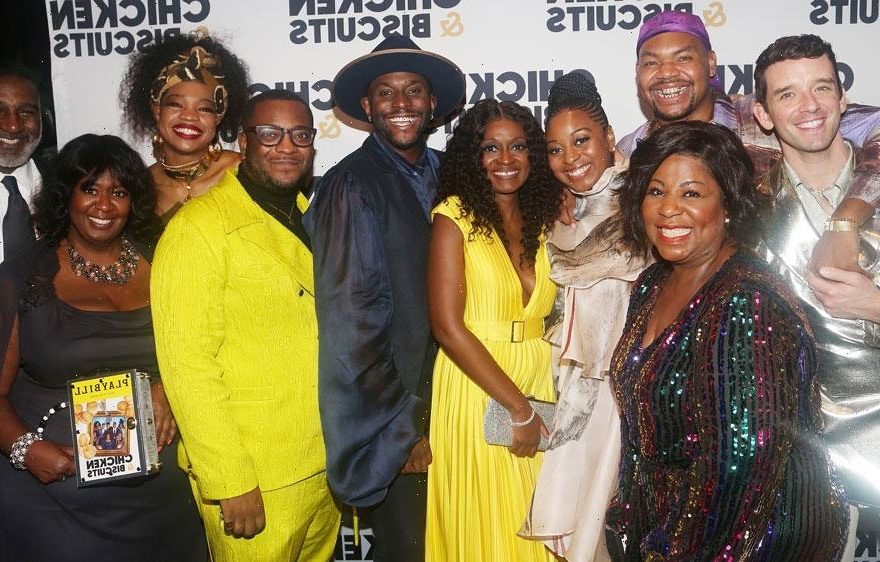The Circle in the Square Theatre — a Broadway house that last opened a revival of Rodgers and Hammerstein’s “Oklahoma!” — transformed on Sunday in the ebullient and nourishing setting of a Black church as “Chicken & Biscuits,” a new comedy by Douglas Lyons, took its opening-night bow.
Attended by guests including Lynn Nottage, Molly Wingwald, Jessie Mueller, Krysta Rodriguez, and Shereen Pimentel, Sunday’s opening night met the occasion of “Chicken & Biscuits” quiet revolution with uproarious joy: A family comedy starring Cleo King, Norm Lewis, and Michael Urie, “Chicken & Biscuits” is part of a post-pandemic movement on Broadway, when the industry’s doors have opened a bit wider to embrace artists of color — or at least populate a season with a record-breaking eight Black playwrights.
“The theater starts in blackface in America,” Zhailon Levingston, who with “Chicken & Biscuits” makes history as the youngest Black director in Broadway history, told Variety on opening night. “It starts in stereotype, and every other culture has been able to use their archetypes as a way to say something larger about society or specific about their culture. For so long, Black people, particularly in comedy, are not allowed to use our own archetypes.”
“What we have the chance to do with ‘Chicken & Biscuits,’” he continued, “is say, ‘You should be able to identify that person. You should know who that person is.’ And what happens if they surprise you, if there’s something deeper underneath the archetype of that aunt you know well?”

As reviews trickled in at the opening night after-party, held at Elsie’s Rooftop, what Levingston offered was, in part, a rebuttal: It’s the point that comedic caricatures of Black families and church life fuel “Chicken & Biscuits.”
“Broadway has to rethink what good and quality is,” playwright Douglas Lyons told Variety at the after party. “This is comfort food. This isn’t Brecht or Shakespeare. And I’m owning that. What Broadway misses out on is the people who might enjoy that, Black audiences who can laugh at their aunties on stage.”
“I was afraid to come here, to Broadway, because I know the attitude and high-standing uppityness of this place,” he continued. “I really was afraid, but now that we’re here, I think our audiences are changing what Broadway is.”
Inside the theater on Sunday, which ripped and roared through the entire performance, Lyons’ assertion couldn’t have been more clear, as well as a double, more troubling reality: While plays including “Chicken & Biscuits” will bring hordes of new audience members to Broadway, Black playwrights like Lyons must also shoulder an industry which has yet to fully recover.
“We know that we — the Black playwrights this season — are literally pushing the boulder uphill,” Lynn Nottage, the two-time Pulitzer Prize-winning playwright who will mount “Clyde’s” this season, told Variety before the show. “Broadway is not up and running to its full potential, and that’s a reality we’re facing. Thank god we’re a resilient people. We’re used to hard work, to obstacles, and we’re used to beating the odds.”
At the after-party, lead producer and six-time Tony winner Hunter Arnold, whose marshaled shows such as “Kinky Boots,” “Hadestown” and “The Inheritance” to Broadway and who offered to produce “Chicken & Biscuits” without ever meeting Lyons or seeing the work, qualified what’s necessary for producers to insulate Black playwrights — or any new voice — from that responsibility.
“It’s your job to make sure the artists don’t fall on their face because of the business. Any artist can fall on their face because of the art, but you’ve got to build a machine,” he told Variety. “I said about this show: Laughter needs full rooms, and for once I’m not going to beat my advertising agency up about what the price point is. The audience will tell us that, and my hope is that the price will evolve as word of mouth spreads.”
“I’d much rather do that than set up a system where we can’t sell anything other than full orchestra prices in previews,” he summed. “Then you’ve got an empty room, and the show fails because laughter doesn’t travel through a patchy audience. You’ve got to have a business model that sets the art up for success.”
Source: Read Full Article
